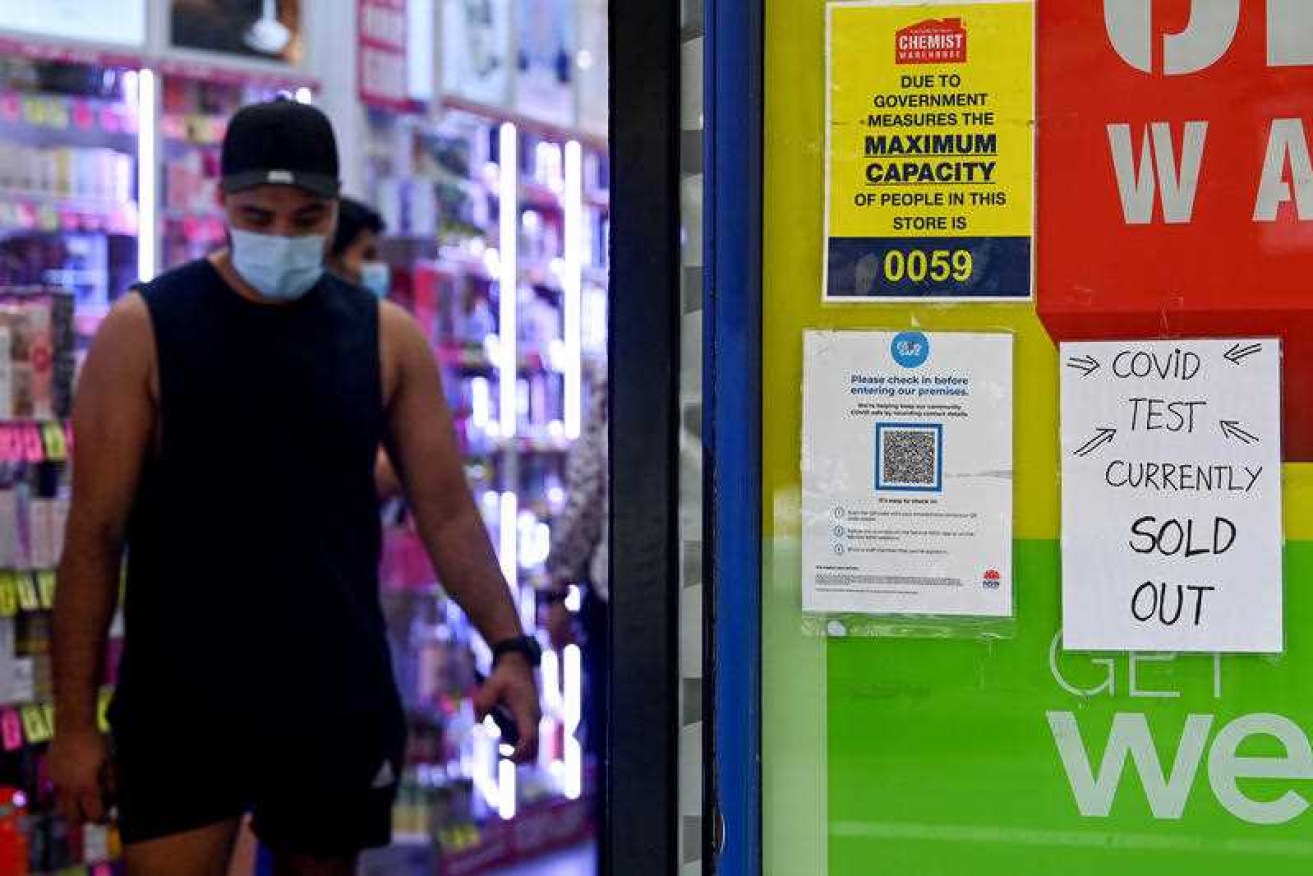Hitches flagged in ‘messy’ NSW move to tough rapid testing rules


Rapid virus tests remain in short supply across the country – and now there are claims shipments are being seized. Photo: AAP
NSW residents who fail to report positive rapid COVID test results now face $1000 fines – but doubts are already emerging about the revamped regime.
Premier Dominic Perrottet announced the tough rule change on Wednesday, promising a “seamless” process to upload results to the Services NSW app.
Residents have a week to get on board with the requirements or face fines. Police will enforce the rules from January 19 – although Mr Perrottet has already acknowledged it will be difficult.
“Community policing is crucial but also in providing awareness. It is not simply about enforcement,” he said.
But the tough line came as rapid tests remained in scarce supply across Australia and retailers warned shortages – and higher prices – would last for weeks.
That prompted economist Alison Pennington, from the Australia Institute, to label NSW’s new rules “absurdly counterproductive”.
“Workers just won’t get tested,” she tweeted on Wednesday.
“Imagine: You’re crook. Options? Drive hours to find elusive RAT. Pay $40 you don’t have. Lose income isolating. Risk job loss and $1000 fine.
“Or: Don’t get tested. Keep working”.
Tweet from @ak_pennington
Ms Pennington was backed up by Chris Rudge, an expert in health law and medical regulation from the University of Sydney. He said the new system was “very unenforceable”.
“I can’t think of many legal instruments that are more unenforceable than this,” Dr Rudge said.
“It inevitably will be either very selective or very patchy, there’s no uniformity or equity of oversight here.”
Dr Rudge pointed to police having to unearth a positive rapid result, or a record or photo of one, to prove a breach of the rules.
“It’s very hard to prove if there’s no positive test available,” he said.
He described the mandatory RAT reporting regime as largely about “self-regulation”, despite the threat of financial penalties for non-compliance.
“The problem with self-regulation is it’s pretty hard to enforce unless there is some chance intervention or a dob in, or something additional to the self-regulation,” he said.
Tweet from @PMcHoward
NSW is one of the last states and territories to begin to count rapid tests in its daily virus numbers. It had 34,759 infections on Wednesday, although authorities have warned for days that numbers are likely to be unreliable because of the backlog in the PCR testing system.
Chief health officer Kerry Chant apologised for the “messy” transition to the rapid testing approach.
She urged anyone who did not have access to a rapid test to get a PCR, especially if they had underlying conditions.
People who test positive on RATs have to isolate for seven days, unless they have no symptoms and no known exposure – in which case they must do another test within 24 hours.
Those who have mild symptoms are urged to seek health advice if their condition doesn’t improve, or worsens, after several days.
“I know it’s confusing, I know it’s been really messy,” Dr Chant said.
“This transition has been quicker than we ever wanted it to be, but we are transitioning.”
Tweet from @IanTufrey
Tweet from @jennynoise
Tweet from @CheriseMB
The NSW change came as major retailers warned shortages of rapid tests were unlikely to ease soon.
Pharmacy operator API, which owns the Priceline, Soul Pattinson and Pharmacist chains, said it expected RAT supplies to be tight at least until February.
“API received 500,000 tests last week, will receive a further 250,000 this week and again next week, staying at that level until 2.75 million arrive in mid-February,” the company told the ABC.
“We understand that other wholesalers have similar availability challenges in the short term.
“Some suppliers are not taking any more orders. Others are saying orders now will be delivered by the end of February at the earliest.”
The country’s other major pharmacy operator, Chemist Warehouse, is in a similar position. Demand was still outstripping supply, despite regular deliveries nationwide, one of the chain’s directors, Mario Tascone, told ABC News via email.
Both major supermarket chains have imposed one-pack limits on customers to try to keep a lid on demand.
NSW has ordered 100 million RATs and will use them to minimise disruption to schools, transport and health services.
Mr Perrottet said PCR testing would still play a role in NSW, particularly as struggles continued with rapid test supplies. But the new policy would make PCR lines and turnarounds shorter, he said.
He said the shift was not just about counting cases but understanding who had underlying conditions and might need more care.
Those who test positive will be asked for details about their medical background and sorted into high and low-risk cases, with the former to receive extra contact from NSW Health.
NSW also announced a record 21 COVID deaths on Wednesday. However, seven dated back as far as September and October last year.
The number of people in hospital continues to rise, with 2242 people admitted and 175 in intensive care.
-with AAP








